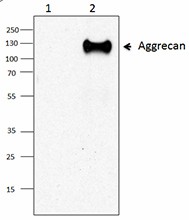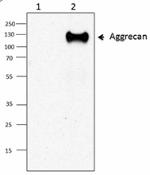- Clone
- M4004A03 (See other available formats)
- Regulatory Status
- RUO
- Other Names
- Aggrecan 1, AGC1, Aggrecan Proteoglycan, Chondroitin Sulfate Proteoglycan 1, Cartilage-Specific Proteoglycan Core Protein, CSPG1, MSK16, CSPGCP, SEDK, and CSPCP
- Isotype
- Mouse IgG1, κ
- Ave. Rating
- Submit a Review
- Product Citations
- publications

-

Western blot analysis of 50ng of recombinant human Aggrecan (G1-IGD-G2) under reducing (lane 1) or non-reducing (lane 2) using anti-Aggrecan antibody (clone M4004A03).
Aggrecan, also known as aggrecan 1, is the major proteoglycan in the articular cartilage. This high molecular weight protein exhibits a bottlebrush structure, in which chondroitin sulfate and keratan sulfate chains are attached to an extended protein core. Aggrecan plays an important role in the proper functioning of articular cartilage by providing a hydrated gel structure through its interaction with hyaluronan and link proteins. Aggrecan is expressed by chondrocytes and is found to be crucial in chondroskeletal morphogenesis during development. Mutations in this gene may be involved in skeletal dysplasia and spinal cord degeneration. Structurally, aggrecan is composed of two globular domains (G1 and G2) at the N-terminal end and one globular domain (G3) at the C-terminal end, which are separated by a large extended domain (CS) heavily modified with glycosaminoglycans. G1 and G2 domains of aggrecan are separated by the interglobular domain (IGD). Biologically, the G1 domain interacts with hyaluronan acid and link proteins, which forms stable ternary complexes in the extracellular matrix (ECM). The G2 domain is homologous to the tandem repeats of G1 and link proteins, and is involved in product processing. G3 makes up the carboxyl terminus of the core protein, and enhances glycosaminoglycan modification and product secretion. Also, the G3 domain links the proteoglycan aggregates to the ECM proteins, which are fibulins and tenascins. The degradation of aggrecan appears to initiate at the C-terminus. The population of aggrecan molecules without the G3 domain increases with aging.
Product DetailsProduct Details
- Verified Reactivity
- Human
- Antibody Type
- Monoclonal
- Host Species
- Mouse
- Immunogen
- Recombinant human Aggrecan produced in 293E cells.
- Formulation
- Phosphate-buffered solution, pH 7.2, containing 0.09% sodium azide.
- Preparation
- The antibody was purified by affinity chromatography.
- Concentration
- 0.5 mg/ml
- Storage & Handling
- The antibody solution should be stored undiluted between 2°C and 8°C.
- Application
-
WB - Quality tested
- Recommended Usage
-
Each lot of this antibody is quality control tested by Western blotting. For Western blotting, the suggested use of this reagent is 0.25 - 2.0 µg per ml. It is recommended that the reagent be titrated for optimal performance for each application.
- Application Notes
-
This antibody works for Western blotting under non-reducing conditions.
- RRID
-
AB_2565486 (BioLegend Cat. No. 674902)
Antigen Details
- Structure
- 2415 amino acids with a predicted molecular weight of approximately 250 kD.
- Distribution
-
Chondrocytes and embryonic brain glia.
- Function
- Plays a key role in neural development, glial scar formation, cell adhesion, cell growth, receptor binding, cell migration, and interaction with other extracellular matrix constituents.
- Ligand/Receptor
- Aggrecan is an enzymatic substrate of MMPs and ADAMT11. It interacts with versican, which is a large ECM proteoglycan.
- Biology Area
- Cell Biology, Signal Transduction
- Antigen References
-
1. Doege KJ, et al. 1991. J. Biol. Chem. 266:894.
2. Nap RJ and Szleifer I. 2008. Biophys. J. 95:4570.
3. Roughley P, et al. 2006. Eur. Cell Mater. 11:1.
4. Kiani C, et al. 2002. Cell Res. 12:19-32.
5. Melin Fürst C, et al. 2013. PLoS One 8:e61407. - Gene ID
- 176 View all products for this Gene ID
- UniProt
- View information about Aggrecan on UniProt.org
Related Pages & Pathways
Pages
Other Formats
View All Aggrecan Reagents Request Custom Conjugation| Description | Clone | Applications |
|---|---|---|
| Purified anti-Aggrecan | M4004A03 | WB |
Compare Data Across All Formats
This data display is provided for general comparisons between formats.
Your actual data may vary due to variations in samples, target cells, instruments and their settings, staining conditions, and other factors.
If you need assistance with selecting the best format contact our expert technical support team.
-
Purified anti-Aggrecan

Western blot analysis of 50ng of recombinant human Aggrecan ...








Follow Us